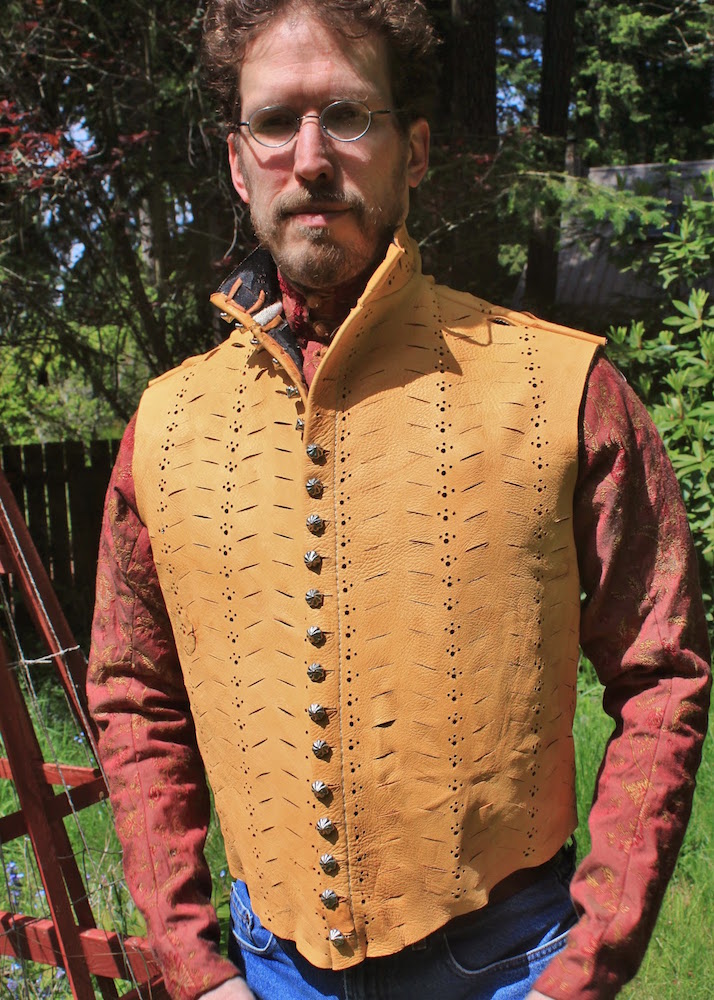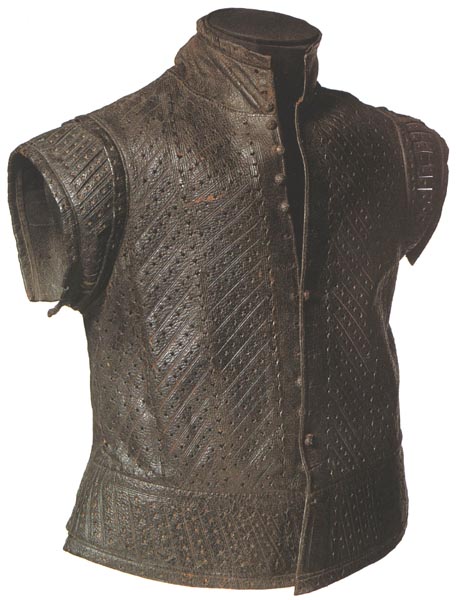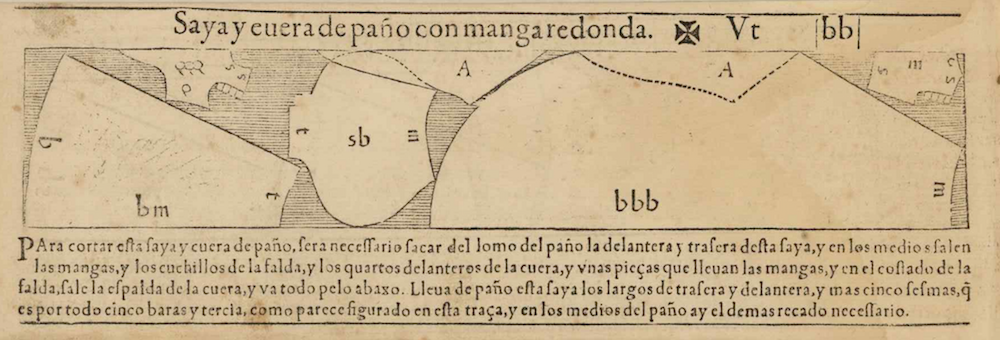What my tools do while I’m sleeping 😉

The majority of the inventory excerpts are transcripts from http://www.anastasiorojo.com however, the translations and missteps are my own. I’ve found a handful of cueras mentioned in inventory lists. Some are made of leather, others of fabric, they are cut, trimmed and in one instance lined in velvet. This is by no means exhaustive and in some entries, I’ve included non-cuera garments as they were listed.
1585 TESTAMENTO E INVENTARIO DE BERNARDINO VIZCARRETO, NATURAL DEL PIAMONTE Y REGIDOR DE VALLADOLID
cuera: yten una cuera de cordovan con beinte y dos botones de oro;
One jerkin of leather with twenty-two gold buttonsyten una cuera de cordovan bieja aforrada en bayeta negra
One old jerkin of leather lined with black baize
http://www.anastasiorojo.com/wp-content/uploads/2014/02/1585-VIZCARRETO.pdf
1570 INVENTARIO DE SEBASTIÁN DE SANTA CRUZ, MERCADER Y HOMBRE DE NEGOCIOS DE BURGOS.
quera: yten una quera de raso negro sajado;
a pinked/cut jerkin of black satinyten una quera de terçiopelo negra forrada en felpa parda;
A jerkin of black velvet lined with brown plushyten una cuera de terçiopelo berde;
An old velvet jerkinyten un jubon de raso negro picado y pespuntado muy roto;
A very old doublet of quilted(?) black satinuna cuera guarnezida de pasamanos de oro aderezada con anbar
A jerkin decorated with gold lace and trimmed with amber(?)yten una cuera de raso guarneçida de terçiopelo
A jerkin of satin trimmed with velvetyten sus cuera y mangas de lo mismo
Another jerkin and sleeves of the same
http://www.anastasiorojo.com/wp-content/uploads/2013/07/1570-STA-CRUZ.pdf
1595 TESTAMENTARIO, INVENTARIO Y BIBLIOTECA DE GASPAR CLAVIJO, CARPINTERO MORISCO VIEJO
quera: yten una quera tapetada de cordoban bieja
An old black leather jerkin
http://www.anastasiorojo.com/wp-content/uploads/2014/08/1595-GASPAR-CLAVIJO.pdf
1571 INVENTARIO DE BIENES DEL MARQUÉS DE TÁBARA, EN SUS CASAS DE VALLADOLID
cuera: una cuera de cordovan llena de pasamanillos aforrada en terciopelo negro con mangas de lo mismo;
A leather jerkin with narrow lace lined in black velvet with sleeves of the sameotra quera de cordovan camuzada llena de rebeticos de raso negro aforrada en tafetan negro;
A leather jerkin of ( Camuzada, possibly Gamuzada – Chamois color?) with black satin and lined with black taffetaotra cuera picada con un pasamano biexo.
An old pinked jerkin with trim
http://www.anastasiorojo.com/wp-content/uploads/2013/07/1571-TABARA.pdf
“Richer than We Thought: The Material Culture in 16th Century St Augustine”
2 cordovan doublets
Goods of Dona Mayor de Arango (1570) http://elizabethancostume.net/cyte/node/239

Long have I coveted Scott Perkin’s leather jerkin, which is based off the jerkin at the Museum of London and written about in Janet Arnold’s “Pattern of Fashion”.


But I am not a leather worker*, I didn’t want to get a very nice hide and ruin it with my amateur attempts. So I filed the idea away in the back of my head until one night I came across some leather on eBay.
It was cheap and looked like there was enough to make a jerkin, one press of the buy now button and I good. The blitheful glow of a new project set in. I started planning out how I wanted it to look, what buttons I would need, to slash or not to slash?
But then I realized an important question needed answering, did women ever wear leather jerkins?
The common assumption is that it’s a male garment with origins as armor, and possibly evolved into the 17th-century buff coat. (I am not an armor historian if this is incorrect please let me know.)
In “Patterns of Fashion”, Arnold mentions:
“Alcega gives pattern diagrams of some petticoats or skirts (‘saya’) with ‘a jerkin, a little cassock such as women use in Spain’ as Minsheu translates ‘sayuelo’; others are with a ‘cuera’, translated by Minsheu as ‘a Spanish leather jerkin’. The latter is a bodice which has apparently taken its name from the leather from which it was once made.”
The diagram referenced in the quote

Language is a living thing, the meaning of words change. In my look through the English translation of Alcega’s book, I found some of the translations questionable, but I am inclined to agree. Paño or cloth, being mentioned in the layout means it is not being made from leather.
Lexicon Tetraglotton, an English-French-Italian-Spanish Dictionary 1660 lists the following:
Part 2: Digging through some Spanish and English Inventories.
*I did make a leather jerkin a long time ago out of chrome tanned suede cut from skirts from the thrift store. I looked like a badass female Iago in it, but I’ve learned a great deal about sewing since then.
References
http://blog.museumoflondon.org.uk/leather-jerkin-well-examined/
http://garb4guys.blogspot.com/search/label/Leather%20Jerkin
The Mauritshuis collection Anthonis Mor van Dashorst (and studio), Portrait of a Man, 1561
Libro de Geometria, Pratica, y Traça
Lexicon Tetraglotton, an English-French-Italian-Spanish Dictionary 1660